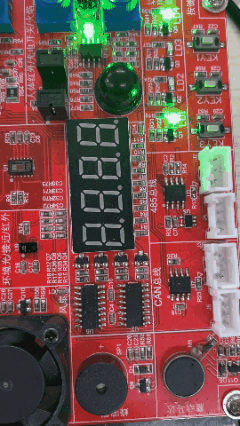目录
demo.c
#include <linux/init.h>
#include <linux/module.h>
#include <linux/fs.h>
#include <linux/uaccess.h>
#include <linux/io.h>
#include "myled.h"
//内核buf
char kbuf[100]="";
//地址映射
//定义RCC虚拟地址
unsigned int *rcc_vir = NULL;
//定义GPIOE虚拟地址
gpio_t *gpioe_vir = NULL;
//定义GPIOF虚拟地址
gpio_t *gpiof_vir = NULL;
//用户将用户空间的数据写到内核空间
#define LED1_ON (gpioe_vir->ODR|=(0x1<<10))
#define LED1_OFF (gpioe_vir->ODR &=(~(0x1<<10)))
#define LED2_ON (gpiof_vir->ODR|=(0x1<<10))
#define LED2_OFF (gpiof_vir->ODR &=(~(0x1<<10)))
#define LED3_ON (gpioe_vir->ODR|=(0x1<<8))
#define LED3_OFF (gpioe_vir->ODR &=(~(0x1<<8)))
//从用户空间读取数据
ssize_t led_write(struct file *file, const char __user *ubuf, size_t size, loff_t *loffs){
int res;
printk("%s%s%d\n",__FILE__,__func__,__LINE__);
//当用户空间写入的数据大小大于kbuf时,size大小为kbuf大小
size=size>sizeof(kbuf)? sizeof(kbuf):size;
//将用户空间的数据拷贝的内核空间
res=copy_from_user(kbuf,ubuf,size);
//成功返回0,失败返回为拷贝的字节数
if(res){
printk("copy from user error\n");
return -EIO;
}
//LED1亮
if(kbuf[0]==1){
LED1_ON;
LED2_OFF;
LED3_OFF;
}
//LED2亮
else if(kbuf[0]==2){
LED1_OFF;
LED2_ON;
LED3_OFF;
}
//LED3亮
else if(kbuf[0]==3){
LED1_OFF;
LED2_OFF;
LED3_ON;
}
return size;
}
int led_open(struct inode *indoe, struct file *file){
printk("%s%s%d\n",__FILE__,__func__,__LINE__);
return 0;
}
int led_close(struct inode *indoe, struct file *file){
printk("%s%s%d\n",__FILE__,__func__,__LINE__);
return 0;
}
//主设备号
unsigned int major = 0;
//文件操作结构体
const struct file_operations fops =
{
.open=led_open,
.write=led_write,
.release=led_close,
};
//入口函数
static int __init demo_init(void){
//注册字符设备驱动,成功返回主设备号,失败返回一个<0
major=register_chrdev(0,"myled",&fops);
if(major<0){
return -EIO;
}
printk("major=%d\n",major);
//ioremap成功返回映射首地址,失败返回NULL
//rcc地址映射
rcc_vir=ioremap(RCC_MP_AHB4ENSETR,4);
if(rcc_vir==NULL){
printk("ioremap rcc_vir error\n");
return -EIO;
}
//gpioe地址映射
gpioe_vir=ioremap(GPIO_E,sizeof(gpio_t));
if(gpioe_vir==NULL){
printk("ioremap gpioe_moder_vir error\n");
return -EIO;
}
//gpiof地址映射
gpiof_vir=ioremap(GPIO_F,sizeof(gpio_t));
if(gpioe_vir==NULL){
printk("ioremap gpioe_odr_vir error\n");
return -EIO;
}
//led1的初始化PE10
*rcc_vir |= (0x1<<4);
gpioe_vir->MODER &= (~(0x3<<20));
gpioe_vir->MODER |= (0x1<<20);
gpioe_vir->ODR &= (~(0x1<<10));
//led2的初始化PF10
*rcc_vir |= (0x1<<5);
gpiof_vir->MODER &= (~(0x3<<20));
gpiof_vir->MODER |= (0x1<<20);
gpiof_vir->ODR &= (~(0x1<<10));
//led3的初始化PE8
gpioe_vir->MODER &= (~(0x3<<16));
gpioe_vir->MODER |= (0x1<<16);
gpioe_vir->ODR &= (~(0x1<<8));
return 0;
}
static void __exit demo_exit(void){
//注销字符设备驱动
unregister_chrdev(major,"myled");
//
iounmap(rcc_vir);
iounmap(gpioe_vir);
iounmap(gpiof_vir);
}
module_init(demo_init);
module_exit(demo_exit);
MODULE_LICENSE("GPL");test.c
#include <stdio.h>
#include <sys/types.h>
#include <sys/stat.h>
#include <fcntl.h>
#include <unistd.h>
#include <string.h>
int main(int argc,const char * argv[])
{
int fd=open("/dev/myled",O_RDWR);
if(fd==-1){
perror("open error");
return -1;
}
char buf[128]="";
while(1){
buf[0]=1;
write(fd,buf,sizeof(buf));
sleep(1);
buf[0]=2;
write(fd,buf,sizeof(buf));
sleep(1);
buf[0]=3;
write(fd,buf,sizeof(buf));
sleep(1);
}
close(fd);
return 0;
}
led.h
#ifndef __MYLED_H__
#define __MYLED_H__
typedef struct {
volatile unsigned int MODER; // 0x00
volatile unsigned int OTYPER; // 0x04
volatile unsigned int OSPEEDR; // 0x08
volatile unsigned int PUPDR; // 0x0C
volatile unsigned int IDR; // 0x10
volatile unsigned int ODR; // 0x14
volatile unsigned int BSRR; // 0x18
volatile unsigned int LCKR; // 0x1C
volatile unsigned int AFRL; // 0x20
volatile unsigned int AFRH; // 0x24
volatile unsigned int BRR; // 0x28
volatile unsigned int res;
volatile unsigned int SECCFGR; // 0x30
}gpio_t;
#define RCC_MP_AHB4ENSETR 0x50000A28
#define GPIO_E 0x50006000
#define GPIO_F 0x50007000
#endifmakefile
#指定架构变量
ARCH ?=
ifeq ($(ARCH),arm)
#指定arm架构编译内核路径
KERNELDIR := /home/ubuntu/linux-5.10.61/
else
#指定x86架构编译内核路径
KERNELDIR :=/lib/modules/$(shell uname -r)/build
endif
#开启一个终端执行pwd指令
PWD := $(shell pwd)
all:
@#-C跳到指定的目录下,读取内核源码目录下的顶层Makefile文件
@#M指定源码所在路径,读取当前目录下的源码文件
make -C $(KERNELDIR) M=$(PWD) modules
clean:
make -C $(KERNELDIR) M=$(PWD) clean
obj-m := demo.o
实验效果























 1508
1508











 被折叠的 条评论
为什么被折叠?
被折叠的 条评论
为什么被折叠?








